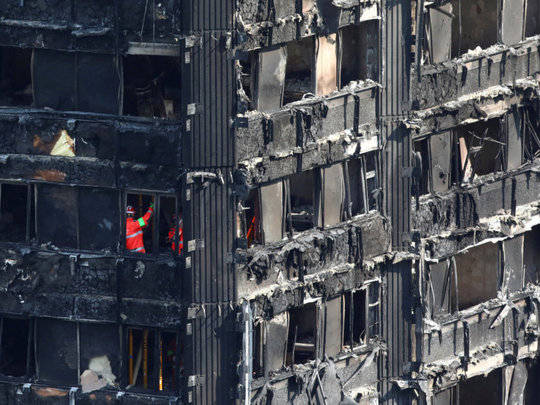
A few days ago fire swept through Grenfell Tower, a large apartment building in London. It’s not yet known what caused the fire, and we aren’t conclusively sure how it spread so quickly, consuming the entire 24-storey building. Nor is it fully known how many died in the fire.
What we do know is that there are ways to help control the spread of fire in apartment buildings, such as sprinkler systems. This has the makings of a scandal for Prime Minister Theresa May’s beleaguered government. Her immigration minister, Brandon Lewis, was formerly the housing minister. He declined to require developers to install sprinklers. The Independent quotes him as telling Parliament in 2014: “We believe that it is the responsibility of the fire industry, rather than the government, to market fire sprinkler systems effectively and to encourage their wider installation. The cost of fitting a fire sprinkler system may affect house building — something we want to encourage — so we must wait to see what impact that regulation has.” People who died in the Grenfell fire might be alive today if regulators had required sprinkler systems. This does not play well for the Tories.
But before we start hanging them in effigy, there are a couple of things we should consider. The first is that, even if the regulation had passed, and required existing developers to retrofit sprinklers into older buildings, Grenfell Tower might not have gotten a sprinkler system before the fire occurred. Regulations are not implemented like instant coffee; they take time to formulate, and further time for businesses to comply. All the political will in the world cannot conjure up enough sprinkler systems, and sprinkler-system installers, to instantly transform a nation’s housing stock.
This, however, is only a quibble; even if Grenfell Tower could not have been saved, there are surely other buildings where fires will soon occur that would benefit from sprinklers. Must we wait for those deaths before we can say that his was a bad calculation? Well, no. But we should wait until we can establish that it was actually a bad calculation.
Good regulations
It may sound heartless to discuss life-saving measures as a calculation. But the fact is that we all make these sorts of calculations every day, about ourselves and others. We just don’t like to admit that we’re doing it. Consider the speed at which many of you drove to work this morning. I’m sure you’re all splendid, careful drivers. Nonetheless, when a vehicle is being piloted at 50 or 60 miles an hour, the margin of error for avoiding an accident is pretty small. To drive a car even at 5 mph (8 km/h) is to accept a small risk of killing oneself and others. To drive at 50 mph is to accept a much higher risk of doing so. It’s a calculation: risk versus reward. .
Unfortunately, “other peoples’ money” has a way of ultimately coming out of our own pockets. If it costs more to build buildings, then rents will rise. People will be forced to live in smaller spaces, perhaps farther away. Some of them, in fact, may be forced to commute by automobile, and then die in a car accident. We don’t see those costs in the same way as we see a fire’s victims; we will never know the name of the guy who was killed in a car accident because he had to live far from work because rents rose because regulators required sprinkler systems. But that is a distinction for public opinion, not for good policymaking. Good regulations would take into account the proximate and distant effects.
Back to the case at hand: Maybe sprinkler systems should be required in multifamily dwellings. It’s completely possible that the former housing minister made the wrong call. But his comment indicates he was thinking about the question in the right way — taking seriously the fact that safety regulations come at a cost which may exceed their benefit. Such calculations have to be made, no matter how horrified the tut-tutting after the fact. Grenfell Tower, of course, was public housing, which changes the calculation somewhat. And yet even there, trade-offs have to be made. The government spends money on a great number of things, many of which save lives. Every dollar it spends on installing sprinkler systems cannot be spent on the health service, or national defence, or pollution control. Would more lives be saved by those measures or by sprinkler systems in public housing? It’s hard to say. It’s possible that by allowing large residential buildings to operate without sprinkler systems, the British government has prevented thousands of people from being driven into homelessness by higher housing costs. It’s also possible that a sprinkler system would not have saved lives in that Grenfell inferno, as the fire apparently spread outside the building as well as within it. Hold these possibilities in mind before condemning those who chose to spend government resources on other priorities. Regulatory decisions are never without costs, and sometimes their benefits are invisible.
— Bloomberg
Megan McArdle is a Bloomberg View columnist. She is the author of The Up Side of Down: Why Failing Well Is the Key to Success.










